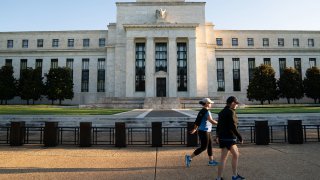
Joggers pass the Marriner S. Eccles Federal Reserve building in Washington, D.C., on Tuesday, Aug. 18, 2020.
The Federal Reserve's recent announcement that it will join the Network for Greening the Financial System, a consortium of central banks intent on using financial regulation to combat climate change, should raise concern for those observing a troubling trend in the politicization of financial supervision.
European regulators have begun injecting ill-defined climate metrics into their supervision of regulated firms and U.S. lawmakers on the far left are urging our financial regulators to join them.
Radical climate activists and their enablers on Capitol Hill are incapable of passing the Green New Deal through the legislative process because the American people know it would crush jobs, increase the cost of food and fuel, and have lasting negative impacts on American competitiveness and economic exceptionalism.
As a result, they want to use financial regulation as a backdoor to achieve their ill-conceived objectives. This effort is less about predicting financial stress from climate change and more about causing financial stress for industries that climate extremists hate.
Question of authority
The greatest risk to financial stability is not an insufficient focus on climate change.
It is an extreme policy agenda that would weaponize financial regulation to discriminate against fossil energy — the most affordable, reliable source of energy that has powered the American economy and American energy independence.
Money Report
Senate Democrats, in a recent partisan report, openly call for regulators to discourage financial firms from extending credit to industries that "amplify climate risk," such as coal, oil or natural gas.
Lost on the authors of this report is the fact that managing climate risk is outside the primary authority of financial regulators and that such actions would increase the costs for Americans to heat their homes, fuel their vehicles or feed their families — all amidst a once in a century health and economic crisis.
Earlier this month, I led a letter with 46 of my House Republican colleagues to Federal Reserve Chairman Jerome Powell and Vice Chair for Supervision Randal Quarles, urging the Fed to proceed cautiously when deciding whether to incorporate climate change scenarios into supervisory stress tests.
The letter raises concerns about many methodological challenges with inserting ill-defined, subjective climate metrics into its tests and urges the Fed not to simply import climate supervision criteria from European regulators via the NGFS if those tests would disadvantage U.S. banks or American industry.
Despite some media claims to the contrary, it is important to note that the letter doesn't deny the existence of climate change or the potential financial impacts of changing weather patterns. It simply suggests that the topic deserves thoughtful, well-reasoned discussion based on objective data rather than a knee-jerk reaction to calls from radical activists.
The letter also points out that ill-defined climate stress metrics may drive banks to accelerate the recent trend of politicizing access to capital and "de-banking" certain industries that are unpopular with vocal policymakers.
Corporations being bullied
Over the last several years we have witnessed banks publicly commit not to do business with certain legal companies in politically unpopular industries. These decisions were not based on the creditworthiness of the borrowers. They were based purely on politics.
The de-banking of politically unpopular industries is just one example of how U.S. corporations are responding to the bullying from the far left to be agents of social change at the expense of long-term economic growth.
Leaders of the nation's largest companies recently ceded the primacy of shareholders to so-called "stakeholders."
"Stakeholder capitalism," or the left's ideals for it, takes for granted the laws of the supply and demand, and discounts the market forces that govern businesses' success or failure.
Shareholder primacy is not about elevating the select few. It is about establishing metric-based accountability for corporate leaders to ensure they are operating efficiently and effectively.
That efficacy and productivity then, in turn, benefit employees, communities and suppliers. In today's market, a company cannot be successful without a focus on these other constituencies. But it must first and foremost make a profit to be viable.
Caring about broader social concerns, treating employees, suppliers and customers well and engaging in philanthropy within the community may all engender social support for a corporation, and in that sense may advance long-term shareholder value maximization. But that is not the paradigm those on the far left are urging the business community to adopt. Instead, they want a new paradigm that subordinates the interests of shareholders to the whims of "stakeholders."
Fortunately, some current regulators are pushing back against the politicization of access to capital.
An independent Fed
The Office of the Comptroller of the Currency recently issued its Fair Access Rule, which prohibits large banks from discriminating against legally operating businesses purely for political or public relations purposes.
The Department of Labor issued a rule to ensure retirement savers are not harmed by asset managers making investment decisions based on environmental, social and governance concerns at the expense of investor returns.
The new administration will almost certainly prioritize using every possible avenue to advance its extreme climate and social agenda. Some corporations, ever worried about fallout and public shaming from the far left, will likely continue to make decisions based on politics and public relations concerns.
That is why it is important the Fed maintain its independence and, along with other financial regulators, resist calls from the far left to pick winners and losers in the capital markets to advance extreme political agendas.
House Republicans made our position clear through our letter. Politicization of access to capital is unacceptable and we will not allow the weaponization of financial regulation to go unchecked.
—Congressman Andy Barr represents Kentucky's 6th District in the U.S. House of Representatives.
For more insight from CNBC contributors, follow @CNBCopinion on Twitter.



